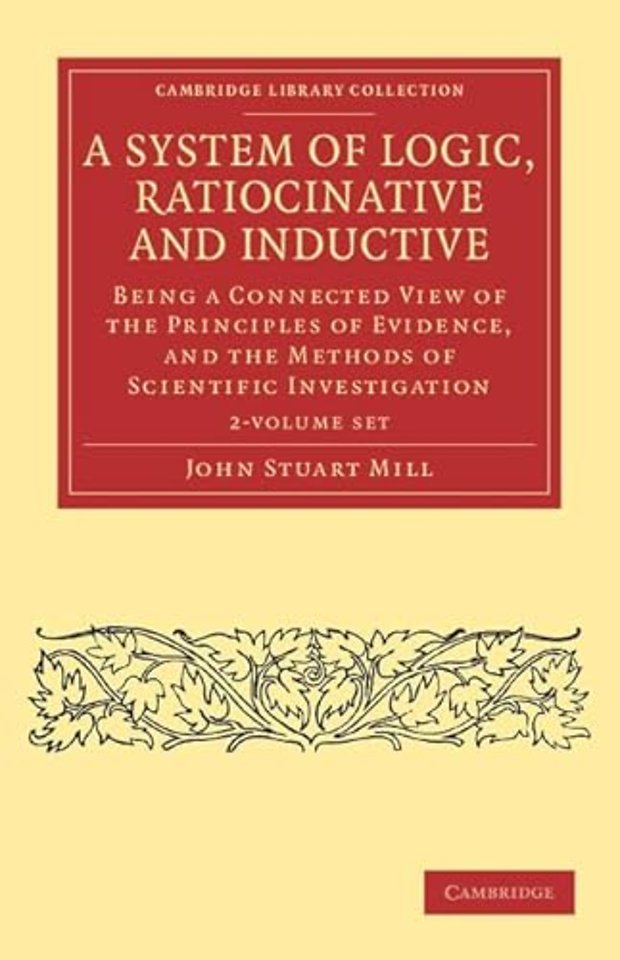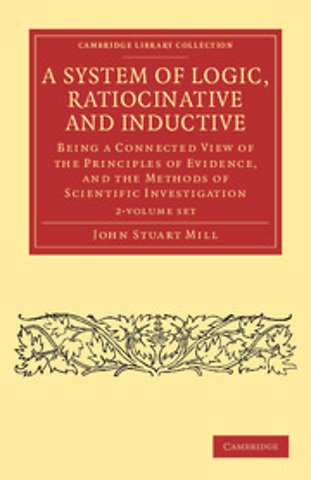Volume 1: Preface; Introduction; Book I. Of Names and Propositions: 1. Of the necessity of commencing with an analysis of language; 2. Of names; 3. Of the things denoted by names; 4. Of propositions; 5. Of the import of propositions; 6. Of propositions merely verbal; 7. Of the nature of classification, and the five predicables; 8. Of definition; Book II. Of Reasoning: 1. Of inference, or reasoning, in general; 2. Of ratiocination, or syllogism; 3. Of the functions, and logical value, of the syllogism; 4. Of trains of reasoning, and deductive sciences; 5. Of demonstration, and necessary truths; 6. The same subject continued; Book III. Of Induction: 1. Preliminary observations on induction in general; 2. Of inductions improperly so called; 3. On the ground of induction; 4. Of laws of nature; 5. Of the law of universal causation; 6. Of the composition of causes; 7. Of observation and experiment; 8. Of the four methods of experimental inquiry; 9. Miscellaneous examples of the four methods; 10. Of plurality of causes; and of the intermixture of effects; 11. Of the deductive method; 12. Of the explanation of laws of nature; 13. Miscellaneous examples of the explanation of laws of nature. Volume 2: Book III. On Induction (continued): 14. Of the limits to the explanation of laws of nature; and of hypotheses; 15. Of progressive effects; and of the continued action of causes; 16. Of empirical laws; 17. Of chance, and its elimination; 18. Of the calculation of chances; 19. Of the extension of derivative laws to adjacent cases; 20. Of analogy; 21. Of the evidence of the law of universal causation; 22. Of uniformities of co-existence not dependent upon causation; 23. Of approximate generalizations, and probable evidence; 24. Of the remaining laws of nature; 25. Of the grounds of disbelief; Book IV. Of Operations Subsidiary to Induction: 1. Of observation, and description; 2. Of abstraction, of the formation of conceptions; 3. Of naming, as subsidiary to induction; 4. Of the requisites of a philosophical language; and the principles of definition; 5. Of the natural history of the variations in the meaning of terms; 6. The principles of a philosophical language further considered; 7. Of classification, as subsidiary to induction; 8. Of classification by series; Book V. On Fallacies: 1. Of fallacies in general; 2. Classification of fallacies; 3. Fallacies of simple inspection, or à priori fallacies; 4. Fallacies of observation; 5. Fallacies of generalization; 6. Fallacies of ratiocination; 7. Fallacies of confusion; Book VI. On the Logic of the Moral Sciences: 1. Introductory remarks; 2. Of liberty and necessity; 3. That there is, or may be, a science of human nature; 4. Of the laws of mind; 5. Of ethology, or the science of the formation of character; 6. General considerations on the social science; 7. Of the chemical, or experimental method in the social science; 8. Of the geometrical, or abstract method; 9. Of the physical, or concrete deductive method; 10. Of the inverse deductive, or historical method; 11. Of the logic of practice, or art; including morality and policy.

